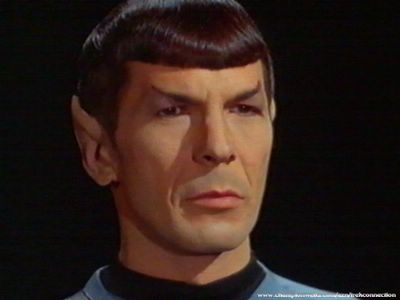There's another movie, apparently closer to being made (though how close is uncertain from the report in
SciFi Wire) that's about how the first Star Trek conventions came about. Writer Paul Hernandez, who the story names as the film's director, described “
Star Date” this way:
"Picture this: In the opening scene it's 1972, and a couple is necking in this car, and this guy is very visibly a nerd, and you wonder what she's doing with him. Then, he notices the time, and he says he has to run home because there's a rerun of a Star Trek episode that he has missed, and he never saw it. Well, she breaks up with him."
He then decides to organize a Trek-watching event to find like-minded girls, but instead of the 10 people he expects, 10,000 show up. "It's the invention of pop culture and results in the first convention," Hernandez said.
How entertaining this seems to you depends on your taste, but what especially bothers me is SciFi Wire's assertion, based no doubt on something Hernandez said, that it's "based on a true story."
It may be based on the true story of something, but not how Star Trek conventions started. The first major convention in New York City---which as far as I know is the first Star Trek convention of any kind---was organized not by nerdy boys trying to get girls, but by three women who were particularly fond of Star Trek.
As I wrote in a past post, many of the fans responsible for the early conventions, organizations, newsletters, letter campaigns and fan fictions were women. Many had careers, some had advanced academic degrees, and some were mothers.
It's not as serious a deal as the movies that made it seem that the American Civil Rights movement or the South Africa anti-apartheid movement were actually the work of white men instead of the courageous black leaders and the many people of color who sacrificed so much to create them, but it's kind of ugly nevertheless.
Moreover, the Star Trek conventions didn't begin pop culture, whatever that could possibly mean. There had been science fiction conventions for decades, and Star Trek conventions grew out of them. They did become a pop culture phenomenon, and did create a kind of template for fans of Star Wars and other movies and TV shows. But making false claims for them is just another way of trivializing them.
I'm also not fond of this stereotype of the Trek fan as nerd---in fact, I'm seriously not fond of the nerd stereotype at all.
This opening scene might be charming on screen, but as described it seriously bothers me. The stereotype of the Trek fan as "visibly a nerd so you wonder what" a girl is doing with him, is particularly demeaning. Stereotypes like that are destructive, especially when imposed on real people. There are all kinds of combinations of intelligence, social skills and interests. And all kinds of people who find all kinds of combinations attractive. What's particularly insidious and typical about this stereotype is that it puts down intelligence, as well as diversity, which is exactly the opposite of what Star Trek does.
Now I don't think I'm an unreasonable purist on this. Some Trek fans resent the
Trekkies movies, but I don't. I enjoyed them and learned from them. I understand they show a certain side of Trek fandom but they are fun and let's face it---they didn't have to make that stuff up. I also thoroughly enjoyed "
Free Enterprise" and especially "
Galaxy Quest."
But this premise of the nerdy boys accidentally inventing Star Trek conventions plays into every lazy stereotype, and it's false history to boot. Of course, in this story the nerds find they are not alone and they all live happily ever after. Maybe it would make a fun movie, but as Star Trek nears its 40th anniversary, I'd rather see something that's closer to its real history, and its real spirit.

